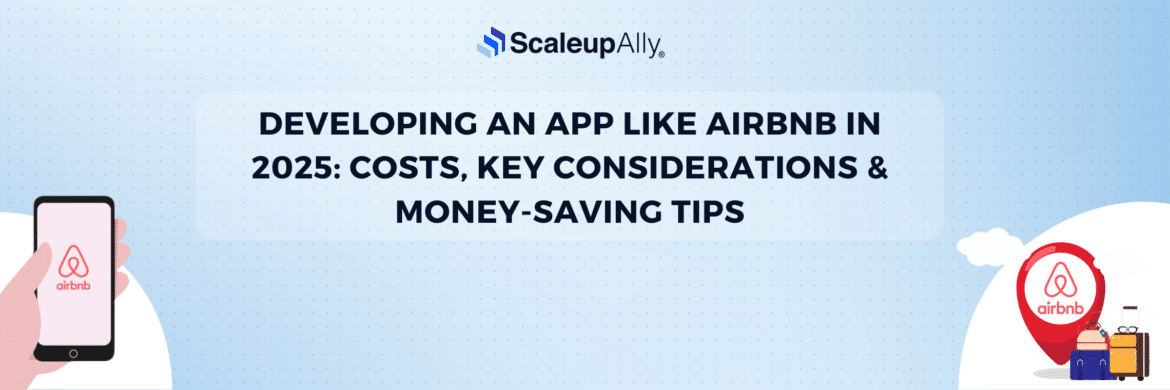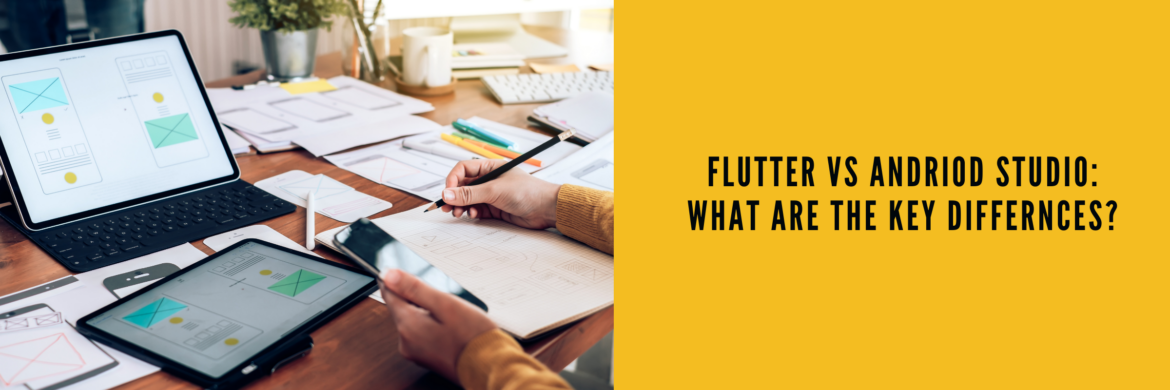
Exploring Different Mobile App Development Technologies: Simplified for Non-Tech Founders
Suprabhat Sen | June 7, 2024 , 11 min read
Table Of Content
It is commonly thought that having a technical founder is necessary when launching a startup. However, technical skills alone are not enough. Possessing business acumen, an entrepreneurial mindset, and various other qualities are equally important for the successful launch of a startup.
Building an app is just one step among many. You can always hire someone to develop the product. However, you must know the various technologies used in mobile app development.
If you are a non-technical person wanting to found a startup but unsure about which mobile app development technologies you need or how to build your product, this blog post will help you.
It will discuss the different mobile app development technologies, such as native, hybrid, and cross-platform, and provide insight into their advantages and disadvantages, enabling you to make an informed decision.
Key Takeaways
- Non-technical founders can still build successful mobile apps by understanding different development approaches—native, hybrid, and cross-platform.
- Native development offers the best performance and user experience but comes with higher costs and longer timelines.
- Hybrid and cross-platform development allow faster, more cost-effective deployment with shared codebases.
- Key factors to consider when choosing a development approach include project scope, budget, timeline, platform preference, and available technical expertise.
- Popular technologies like React Native, Flutter, Swift, Kotlin, and Firebase enable founders to build scalable apps efficiently, even without deep technical backgrounds.
Types of Mobile App Development
1. Native App Development
Native app development refers to building mobile applications specifically for a single platform, such as iOS or Android, using the platform’s native language (Swift or Objective-C for iOS, Java or Kotlin for Android) and development tools.
Native app development typically requires separate codebases for each platform, as the code written for iOS cannot be directly used for Android and vice versa. While this approach may require more resources and time compared to cross-platform development, native apps often provide better performance, user experience, and access to platform-specific features.
Pros:
- Performance: Native apps are built using the platform-specific language (Swift for iOS, Java/Kotlin for Android), allowing optimal performance and seamless integration with the device’s hardware.
- User Experience: Since native apps are designed specifically for each platform, they can provide a superior user experience with interfaces that match the platform’s design guidelines.
- Access to Features: Native apps have full access to the device’s features and APIs, allowing them to integrate advanced functionalities like GPS, camera, and push notifications.
Cons:
- Cost and Time: Developing separate apps for each platform (iOS and Android) can be more time-consuming than cross-platform development.
- Maintenance: Maintaining and updating two separate codebases can be challenging and may require more resources.
2. Hybrid App Development
Hybrid app development refers to building mobile applications that can run on multiple platforms (such as iOS, Android, and sometimes the web) using a single codebase. Hybrid apps are developed using web technologies like HTML, CSS, and JavaScript and then wrapped in a native container that allows them to be installed and run like native apps.
Pros:
- Cost-Effective: Hybrid app development can be more cost-effective than native development since developers can use a single codebase for multiple platforms.
- Faster Development: Developing a hybrid app is faster since developers only need to write code once for both platforms.
- Easier Maintenance: Since there’s only one codebase, maintenance and updates are easier and require less effort.
Cons:
- Performance: Hybrid apps may not perform as well as native apps, especially for complex applications requiring high-performance graphics.
- Limited Access to Features: Hybrid apps may have limited access to device features and APIs compared to native apps.
- User Experience: While hybrid apps can provide a decent user experience, they may not match the polish and performance of native apps.
3. Cross-Platform App Development
Cross-platform app development uses a single code base to build mobile applications that run on multiple operating systems or platforms, such as iOS, Android, and sometimes Windows or the web.
Cross-platform development frameworks like React Native, Flutter, Xamarin, and others allow developers to write code once and deploy it across multiple platforms rather than writing separate code for each platform. These frameworks typically provide tools and libraries that allow developers to access native features and APIs while still using a common language or framework.
Pros:
- Single Codebase: Cross-platform frameworks like React Native and Flutter allow developers to use a single codebase for multiple platforms, reducing development time and cost.
- Native-like Performance: Cross-platform frameworks are designed to provide native-like performance, allowing for smooth and responsive apps.
- Access to Features: Cross-platform frameworks provide access to device features and APIs, allowing for the integration of advanced functionalities.
Cons:
- Tooling and Ecosystem: The tooling and ecosystem for cross-platform development may not be as mature or comprehensive as native development.
- Performance Trade-offs: While cross-platform frameworks aim to provide native-like performance, there may be some performance trade-offs, especially for complex applications.
Choosing the Right Technology for Your App
When selecting the right technology for your mobile app, there are several factors to consider. Here are some key considerations:
- Project Requirements: Evaluate your project requirements, including performance, design, and platform-specific features. Determine whether native, hybrid, or cross-platform development best aligns with your project goals.
- Budget and Time Constraints: Consider your budget and time constraints. Native app development requires separate teams and resources for each platform, which can be more costly and time-consuming compared to hybrid or cross-platform development.
- Target Audience: Understand your target audience and their preferred platforms. If your target audience predominantly uses a specific platform, it may be more beneficial to prioritize native development for that platform.
- Long-Term Strategy: Consider your long-term strategy. If you plan to expand your app to other platforms or add new features in the future, cross-platform or hybrid development may offer more flexibility and scalability.
- Technical Expertise: Evaluate your team’s technical expertise and familiarity with different development technologies. If you have a team experienced in a specific technology, it may be more efficient to leverage their expertise for native or hybrid development.
By carefully considering these factors, you can make an informed decision that aligns with your app’s goals and maximizes its potential for success.
Top 8 Mobile App Development Technologies For Your Business
1. React Native
React Native is a popular choice for startups because it allows developers to build mobile apps for iOS and Android platforms using a single codebase. This means you can reach a larger audience without developing separate apps for each platform, saving time and resources. React Native is known for its performance and efficiency, making it a great choice for startups looking to launch their apps quickly and cost-effectively.
2. Flutter
Flutter is another cross-platform framework that is gaining popularity among startups. It offers fast development and expressive user interfaces, allowing you to create beautiful, high-performance apps for both iOS and Android. Flutter uses the Dart programming language, which is easy to learn and use, making it ideal for startups with limited resources.
3. Swift(iOS)
Swift is the programming language used for iOS app development. It is known for its speed and safety features, making it a great choice for startups building high-performance, native iOS apps. Swift is easy to learn and use, making it ideal for startups that want to develop and launch their iOS apps quickly.
4. Kotlin(Android)
Kotlin is the official language for Android development, offering concise code and interoperability with Java. It is known for its safety features and compatibility with existing Android languages, making it a great choice for startups looking to build secure and stable Android apps.
5. Firsebase
Firebase is a comprehensive Google platform that provides various mobile and web app development services. It offers real-time databases, authentication, hosting, and analytics, making it easier for startups to build high-quality apps without managing complex infrastructure.
6. Java(Android)
Java is a popular choice for Android app development due to its stability, scalability, and extensive libraries. It is a versatile language that can build many apps, making it ideal for startups looking to develop complex Android apps.
7. SwiftUI(iOS)
SwiftUI is a modern UI framework for building native iOS apps with Swift. It simplifies the app development process by providing a declarative syntax and live preview feature, allowing developers to see changes to the app’s UI in real-time.
8. Node.js
Node.js is a popular choice for building the backend of mobile apps. It offers a non-blocking, event-driven architecture, which is efficient for handling a large number of connections. Node.js is easy to scale and is widely used in the startup community for building scalable and reliable backend services.
Turning Your Idea Into an App as a Non-Technical Founder
As a non-technical founder, you might feel overwhelmed when turning your idea into a mobile application. But don’t worry, you don’t have to do it alone. At ScaleupAlly, we understand non-technical founders’ challenges regarding mobile app development. That’s why we have a team of experienced developers who can help you turn your idea into a reality.
When you partner with ScaleupAlly, you get access to our team of developers with experience in native, hybrid, and cross-platform app development. We can help you determine which technology best suits your product and build it from scratch. Our developers will ensure that your app is functional, user-friendly, and visually appealing.
We understand that as a non-technical founder, you might have concerns about the development process, timelines, and costs. That’s why we have a transparent process that keeps you informed every step of the way. Our team will work with you to define the project’s scope, provide a timeline, and update you on progress.
Partnering with ScaleupAlly allows you to focus on what you do best: bringing your idea to the table and growing your business. We will take care of the technical aspects of your mobile app development, allowing you to focus on your strengths and core competencies.
Contact us today to learn how we can help you realize your idea.
Conclusion
Choosing the right technology stack for your startup depends on the app’s complexity, target audience, development timeline, and budget. It’s important to consult with a mobile app development expert to determine the best technology stack for your specific needs.
FAQs
Q: Which development approach is best for non-tech founders?
Cross-platform app development, such as React Native or Flutter, is often the best choice for non-tech founders due to its cost-effectiveness and ability to target multiple platforms simultaneously.
Q: How can I ensure the security of my mobile app?
Security is crucial. Work closely with your development team to implement best practices and regular security audits to protect your app and user data.
Q: Should I prioritize iOS or Android development?
Your choice depends on your target audience. iOS has a more affluent user base, while Android has a broader global reach. Consider both factors when deciding.
Q: What are the key factors when choosing a mobile app development approach?
Considerations include budget, timeline, target audience, required features, platform support, and developer skillset.
Q: What are the current trends in mobile app development?
Some major mobile app development trends include the rise of AI and machine learning in apps, the growth of augmented reality (AR) and virtual reality (VR) apps, increased focus on app security and privacy, and the adoption of 5G technology for faster and more reliable connections.
Q: What is the typical timeline for developing a mobile app?
The timeline can vary widely depending on the app’s complexity, but it typically takes several months to develop a fully-featured mobile app from concept to launch.
Related Blogs

Laravel + Elasticsearch: Smart Search for E-commerce in 2025
Learn how to integrate Elasticsearch with Laravel, from setup and configuration to indexing. Improve your app's search performance using Laravel Elasticsearch.
ScaleupAlly Team
Jul 3 ,
15 min read

Developing an App Like Airbnb in 2025: Costs, Key Considerations & Money-Saving Tips
Discover the cost to build an app like Airbnb, key factors, app types, and smart ways to optimize development expenses for better ROI.
Suprabhat Sen
Jun 29 ,
10 min read

Flutter vs Android Studio: What are the Key Differences?
Flutter vs Android Studio: Wondering which technology to choose to build your next app. Here is a detailed guide that will help you make a decision.
Suprabhat Sen
Jun 28 ,
14 min read








